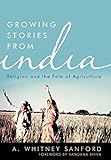Growing stories from India religion and the fate of agriculture Libro electrónico A. Whitney Sanford
Tipo de material: Libro
en línea Idioma: Inglés Series Detalles de publicación: Lexington, Ky. University Press of Kentucky c2012Descripción: xv, 269 páginas ilustraciones mapas 24 centímetrosISBN:
Libro
en línea Idioma: Inglés Series Detalles de publicación: Lexington, Ky. University Press of Kentucky c2012Descripción: xv, 269 páginas ilustraciones mapas 24 centímetrosISBN: - 9780813134123
- 9780813134130
- Disponible en línea
Incluye bibliografía e índice: páginas 241-256
The ecological imagination: From paradigm to practice.. Narratives of agriculture: How did we get here?.. Balaram and the Yamuna River: Entitlement and presumptions of control.. Borrowing Balaram: Alternative narratives.. The festival of Holi: Celebrating agricultural and social health.. The land in between: Constructing nature, wilderness, and agriculture.. Restoration, reciprocity, and repair: Revising the ecological imagination
Disponible para usuarios de ECOSUR con su clave de acceso
The costs of industrial agriculture are astonishing in terms of damage to the environment, human health, animal suffering, and social equity, and the situation demands that we expand our ecological imagination to meet this crisis. In response to growing dissatisfaction with the existing food system, farmers and consumers are creating alternate models of production and consumption that are both sustainable and equitable. In Growing Stories from India: Religion and the Fate of Agriculture, author A. Whitney Sanford uses the story of the deity Balaram and the Yamuna River as a foundation for discussing the global food crisis and illustrating the Hindu origins of agrarian thought. By employing narrative as a means of assessing modern agriculture, Sanford encourages us to reconsider our relationship with the earth. Merely creating new stories is not enough -- she asserts that each story must lead to changed practices. Growing Stories from India demonstrates that conventional agribusiness is only one of many options and engages the work of modern agrarian luminaries to explore how alternative agricultural methods can be implemented. Inglés
Disponible en línea
Adobe Acrobat profesional 6.0 o superior


